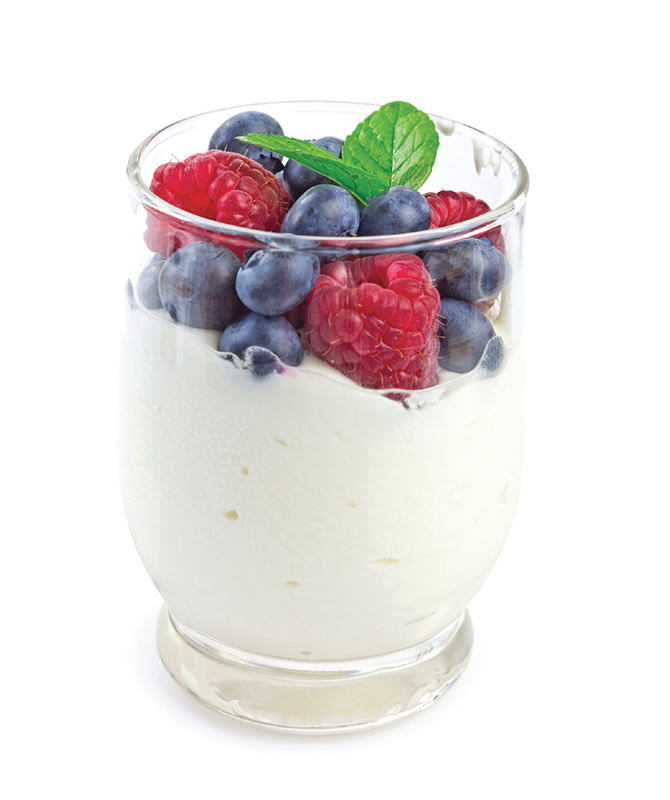

Accelerate recovery and reduce inflammation by consuming fermented foods.
By Nathane L. Jackson, RHN, CSCS
You’ve done the calorie math. You prioritize fruits, vegetables and leafy greens. Meal prep is sacred and you even have meals in the freezer ready to go incase an evening of Netflix and chill is suddenly needed. You’ve thought of it all. Almost! You’re just missing a side of bugs. Yes, bugs! Don’t worry, no one’s saying you should eat crickets, but the reality is that you could get more of the available micronutrients foods have to offer through fermentation.
What Are Fermented Foods?
Fermentation is the process of breaking down carbohydrates by bacteria, yeasts and other microorganisms into simpler substances, like alcohol and organic acids. It also acts as a way of preserving food to retain the nutrients and prevent spoilage.
Examples of fermented foods include sauerkraut, kimchi, pickles, olives, cultured cheese, kombucha, yogurt, kefir, miso and tempeh. When shopping for sauerkraut, kimchi and pickles, be sure to look for products that use a brine of salt and water instead of vinegar. Why? The latter prevents natural fermentation from occurring. Better yet, make your own.
Many ask: Could beer and wine count towards the recommended daily serving of fermented foods? Technically, they are fermented, but beer and wine don’t provide much gut bacteria. Beer doesn’t contain probiotics as the hop acids prevent their survival and the probiotics in wine are destroyed when sulfites are added for preservation.
Why Is It Important?
Our gastrointestinal (GI) tracts are loaded with bugs, or more scientifically stated, microorganisms that help populate and restore good bacteria. In fact, we have over 400 species of microbes living in our gut. Fermented foods are essential to gut health because they’re full of these helpful critters. Bacteria improve our digestion through the production of enzymes that not only boost nutrient uptake, but also reduce gas and bloating.
Fermented foods help disable anti-nutrients, such as oxalates, lectins and phytates, found in grains, beans, legumes, lentils and nuts. These anti-nutrients are a plant’s defense mechanism for survival and can sometimes make our digestive process difficult. Some tribes and nutrition gurus demonize these aforementioned foods and make careless recommendations that everyone should eliminate entire food groups. Similar to gluten and lactose, not everyone experiences the same digestive discomfort. As a result, these foods – all foods for that matter – should be consumed on an individual basis. For example, you may experience digestive discomfort when consuming soybeans, but have no issue with the fermented version called tempeh. The same can be said for those who don’t handle milk well but are okay with yogurt.

When we ferment anti-nutrient foods, phytates are removed giving us access to a greater number of the available vitamins and minerals. Fermenting increases vitamin K, necessary for blood clotting and amino acid metabolism, and B vitamins, responsible for energy and red blood cell production, nervous system support, DNA synthesis and much more. It also decreases protease inhibitors allowing more amino acid availability. This is intriguing for plant-based athletes because many find it challenging to consume enough protein and vitamin B12.
Pre And Probiotics
Prebiotics are fiber-based carbohydrates, not digested but rather fermented by gut microorganisms, promoting the growth of healthy bacteria in the GI tract. Basically, prebiotics feed probiotics, keeping them alive. Examples of prebiotic foods are onion, leek, chicory, garlic, dandelion greens, asparagus, artichoke and banana.
The microorganisms produced in the actual fermentation process are better known as probiotics. They’re usually split into two families, and when buying a probiotic supplement or yogurt you should look for bifidobacteria and lactobacilli. At the very least a few billion of each is recommended.
Probiotics have been shown to help reduce the risk of heart disease, balance the stress hormone known as cortisol, support the immune system and improve mood and other brain functions related to the gut-brain axis.
There’s also research that suggests probiotics may help with weight control. In a 2011 cross-over study published in the journal, Nutrition Research, researchers compared metabolic parameters that are related to metabolic syndrome risks and cardiovascular disease between those who consumed fermented kimchi and those who ate fresh kimchi. They found, “the ingestion of fermented kimchi had positive effects on various factors associated with metabolic syndrome, including systolic and diastolic blood pressures, percent body fat, fasting glucose, and total cholesterol, compared with the fresh kimchi.”
In a Florida-based study published in 2016, researchers gave participants either a protein drink or a protein plus probiotic drink over a two-week period. They had participants go through an intense single leg exercise training protocol followed by performing a modified Wingate test – cycling as hard as they could. The protein only drink resulted in a reduced power output compared to the protein plus probiotic drink. The probiotic bacteria reduced the rise of creatine kinase (an enzyme responsible for the breakdown of muscle) in the blood and therefore demonstrated better recovery and performance.
Endurance athletes often suffer from stomach pain and diarrhea because blood is being pulled out of the digestive system and into working muscles. This process, and the repetitive impact of each stride runners must endure, can damage intestinal cells. A study published in the Journal of the International Society of Sports Nutrition found that probiotic supplementation improved intestinal barrier function and reduced inflammation in trained male endurance athletes. The good bacteria in probiotics increased the integrity of the intestinal wall by helping to create tight junctions between cells. It’s these tight junctions that protect us against a leaky gut and the inflammation that follows.
It’s important to supply the GI tract with sufficient pre and probiotics to fight off infections and combat the harsh effects of treatments, medications and antibiotics. Hormone production that slows with age and a poor ability to manage your stress are two additional factors that may deplete the good bacteria in your gut. Whether the good bacteria are reduced or an overgrowth of bad bacteria occurs, it can happen in the blink of an eye. Similar to weeds in a garden, if you give them an inch, before you know it, they’ve taken over.


















You must be logged in to post a comment Login